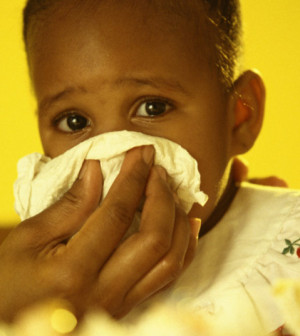- Could Your Grocery Store Meat Be Causing Recurring UTIs?
- Are You Making This Expensive Thermostat Error This Winter?
- Recognizing the Signs of Hypothyroidism
- 10 Strategies to Overcome Insomnia
- Could Artificial Sweeteners Be Aging the Brain Faster?
- Techniques for Soothing Your Nervous System
- Does the Water in Your House Smell Funny? Here’s Why
- Can a Daily Dose of Apple Cider Vinegar Actually Aid Weight Loss?
- 6 Health Beverages That Can Actually Spike Your Blood Sugar
- Treatment Options for Social Anxiety Disorder
Ebola-Infected Newsman Arrives at Nebraska Hospital


The fifth American to become infected with Ebola in West Africa — a freelance cameraman working for NBC News — arrived at a Nebraska hospital Monday to begin treatment for the potentially deadly disease.
Wearing a white hooded jumpsuit, Ashoka Mukpo, 33, arrived by ambulance at the Nebraska Medical Center in Omaha, where he will be kept in an isolation unit designed to treat highly infectious diseases, NBC News reported.
The Nebraska hospital is the same one that successfully treated another American infected with Ebola while working in West Africa — Dr. Rick Sacra, a 51-year-old medical missionary.
Meanwhile, the first Ebola patient to be diagnosed in the United States has “taken a turn for the worse,” federal health officials reported Sunday.
Thomas Eric Duncan, a native of Liberia — one of the West Africa nations being ravaged by the Ebola outbreak — is receiving experimental treatment and supportive care at Texas Health Presbyterian Hospital Dallas. Hospital officials changed his condition from serious to critical over the weekend.
“Ebola is a deadly disease that can affect many parts of the body,” Dr. Thomas Frieden, director of the U.S. Centers for Disease Control and Prevention, said during a Sunday news briefing. “It can be very challenging to support the vital functions while the patient’s natural immune system is trying to fight it [the virus] off.”
Federal and state officials said Sunday that “things are going well” in Dallas as they work to prevent potential spread of the disease. Sixty-six of 114 people being investigated for possible contact with Duncan have been cleared and the rest are being monitored for signs of infection. Those at highest risk include seven health care workers and three members of Duncan’s family who live in Dallas, the Dallas Morning News reported.
None of the known or suspected contacts has developed any symptoms of Ebola, officials said.
Frieden has said repeatedly that Ebola is not easily transmitted — to become infected a person must come into direct contact with the bodily fluids of a person who is suffering symptoms. Those symptoms include fever, muscle pain, vomiting and bleeding and can appear as long as 21 days after exposure to the virus.
Duncan entered the United States on Sept. 19, apparently healthy and without any Ebola symptoms. He first developed symptoms Sept. 24 and sought care two days later at Texas Health Presbyterian Hospital, but was released from the hospital.
Duncan was taken back to Texas Health Presbyterian Hospital on Sept. 28 after his condition worsened.
Meanwhile, President Barack Obama was to meet with national security advisers on Monday to discuss the Ebola outbreak in West Africa and the administration’s response to it, the Associated Press reported.
As many as 4,000 U.S. troops could be deployed to West Africa to combat future spread of the virus. Troops have been slowly building up in the affected nations, including advance forces who are directing the deployment to places of need.
The Ebola epidemic in West Africa is the worst outbreak ever of the disease. So far, an estimated 7,500 people have become infected and an estimated 3,430 people have died in the countries of Guinea, Liberia and Sierra Leone, according to the World Health Organization.
U.S. health officials have warned that the epidemic could strike as many as 1.4 million people by mid-January unless outside nations mount a rapid and concerted response to the crisis.
More information
For more on Ebola, visit the World Health Organization.
Source: HealthDay
Copyright © 2026 HealthDay. All rights reserved.










